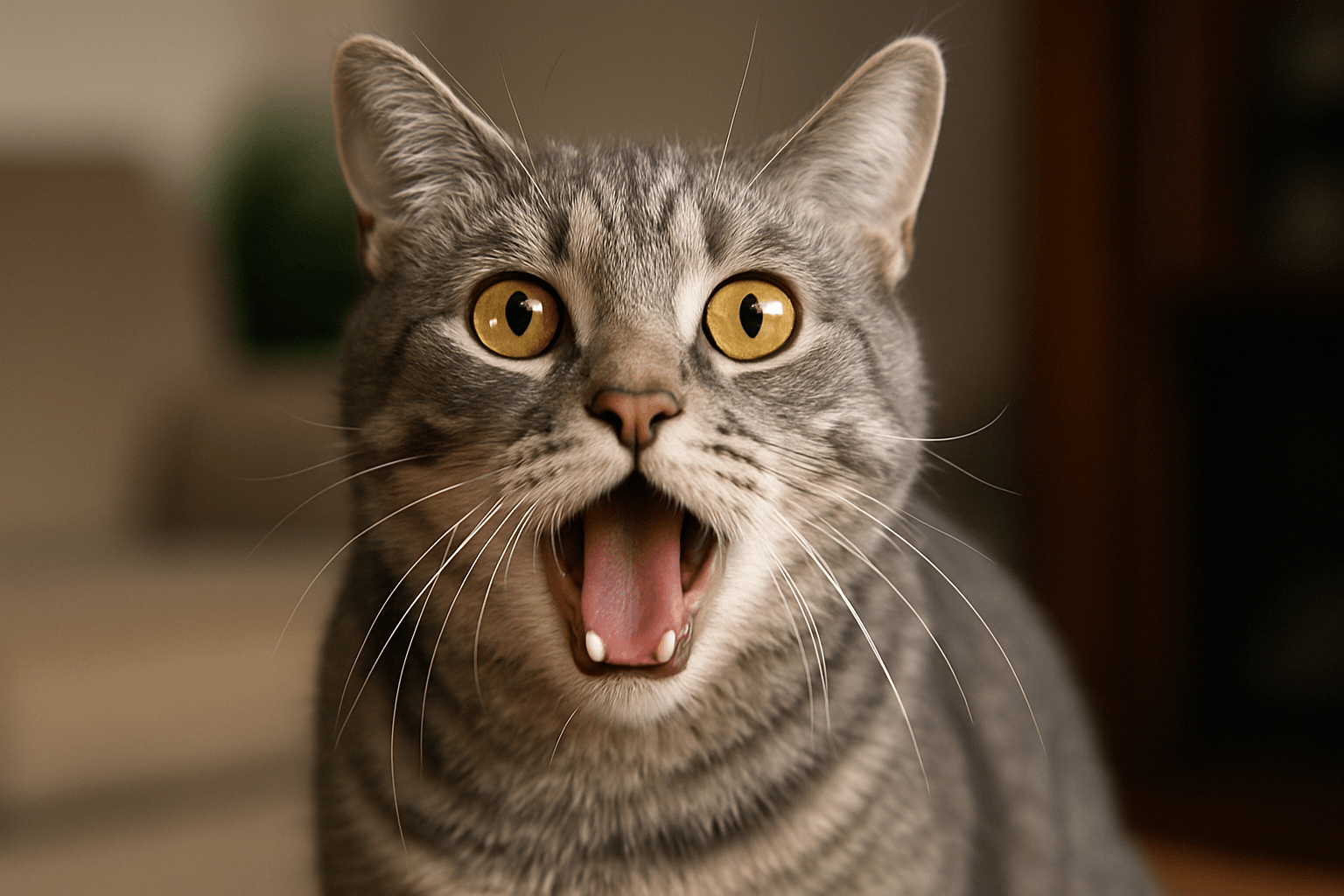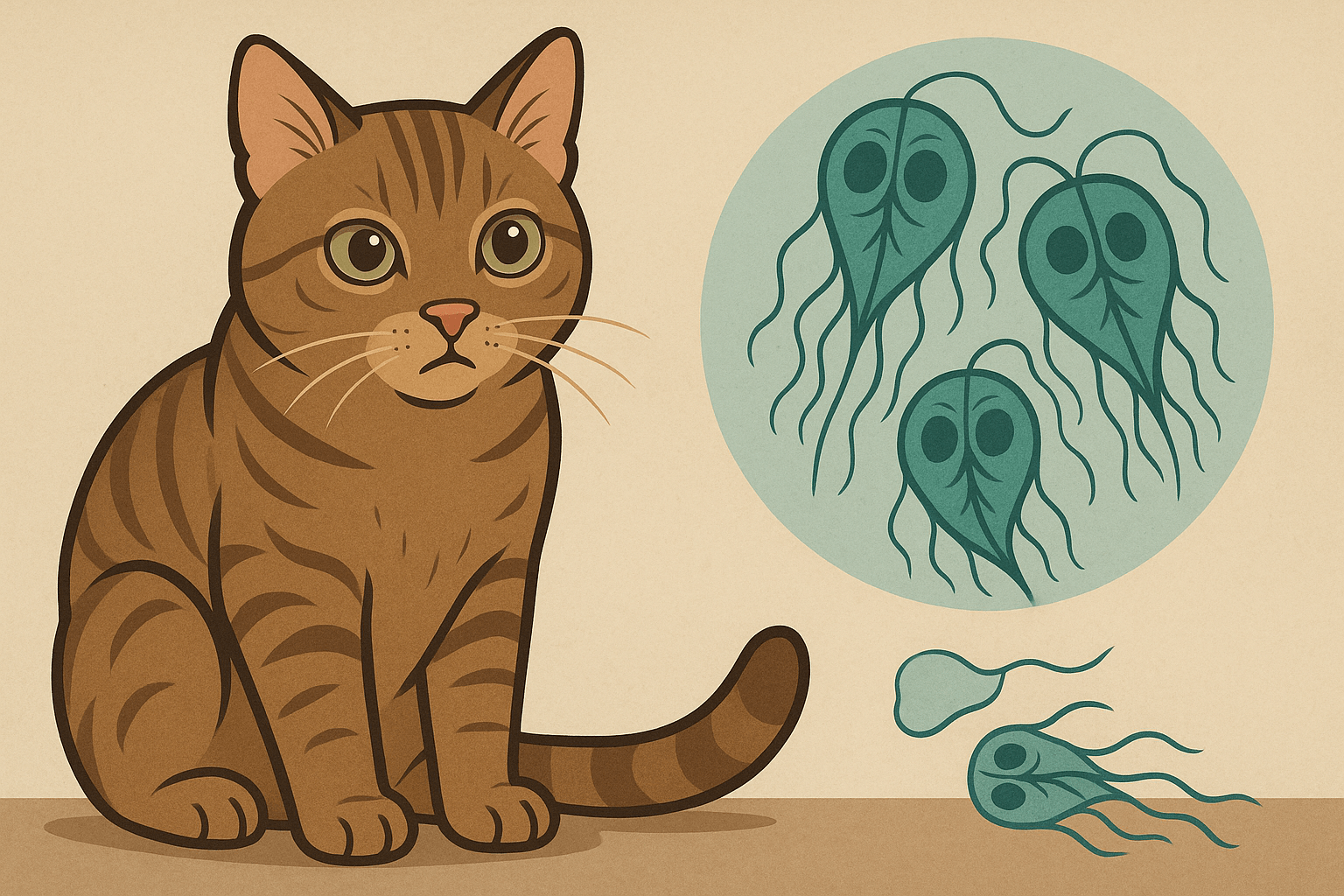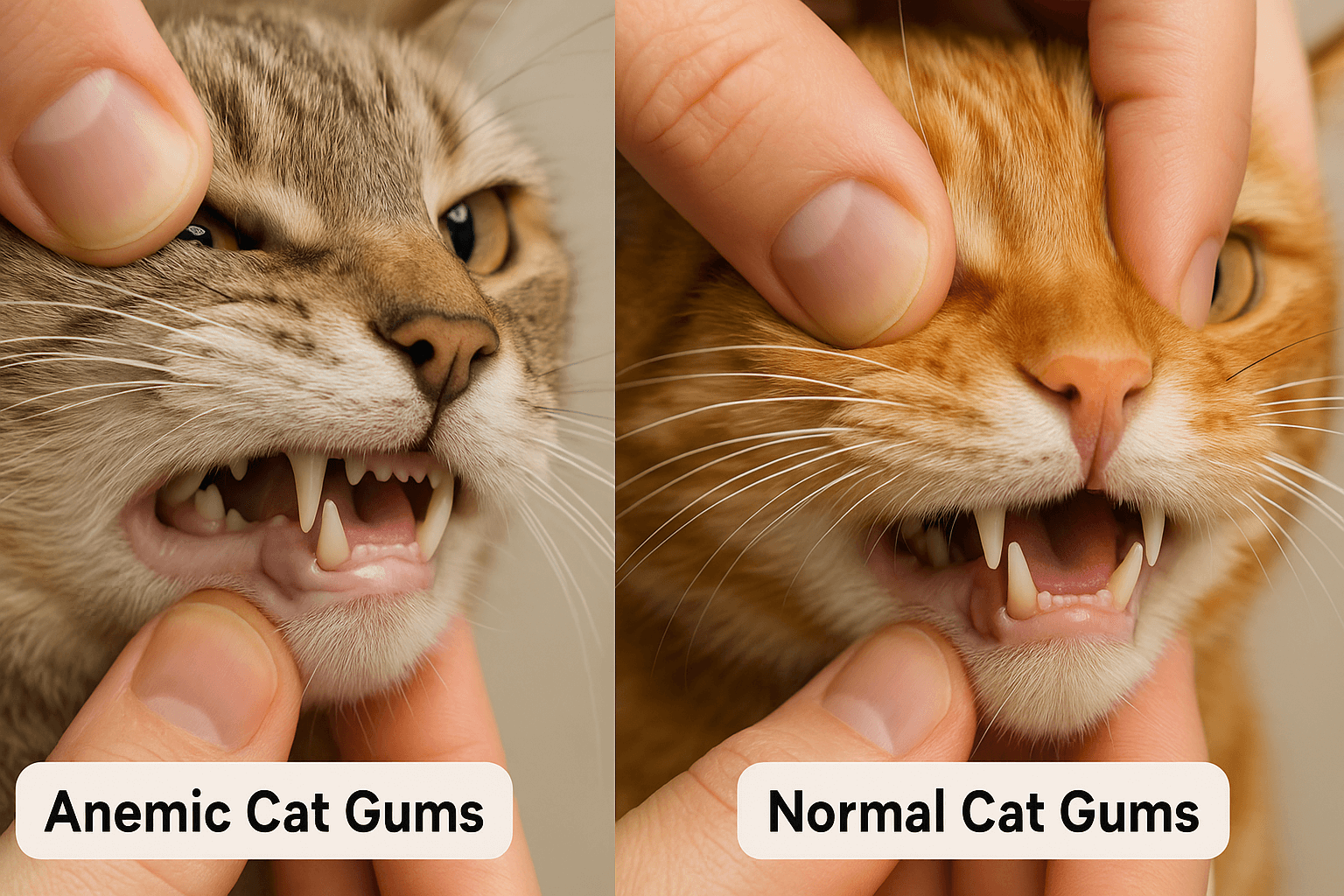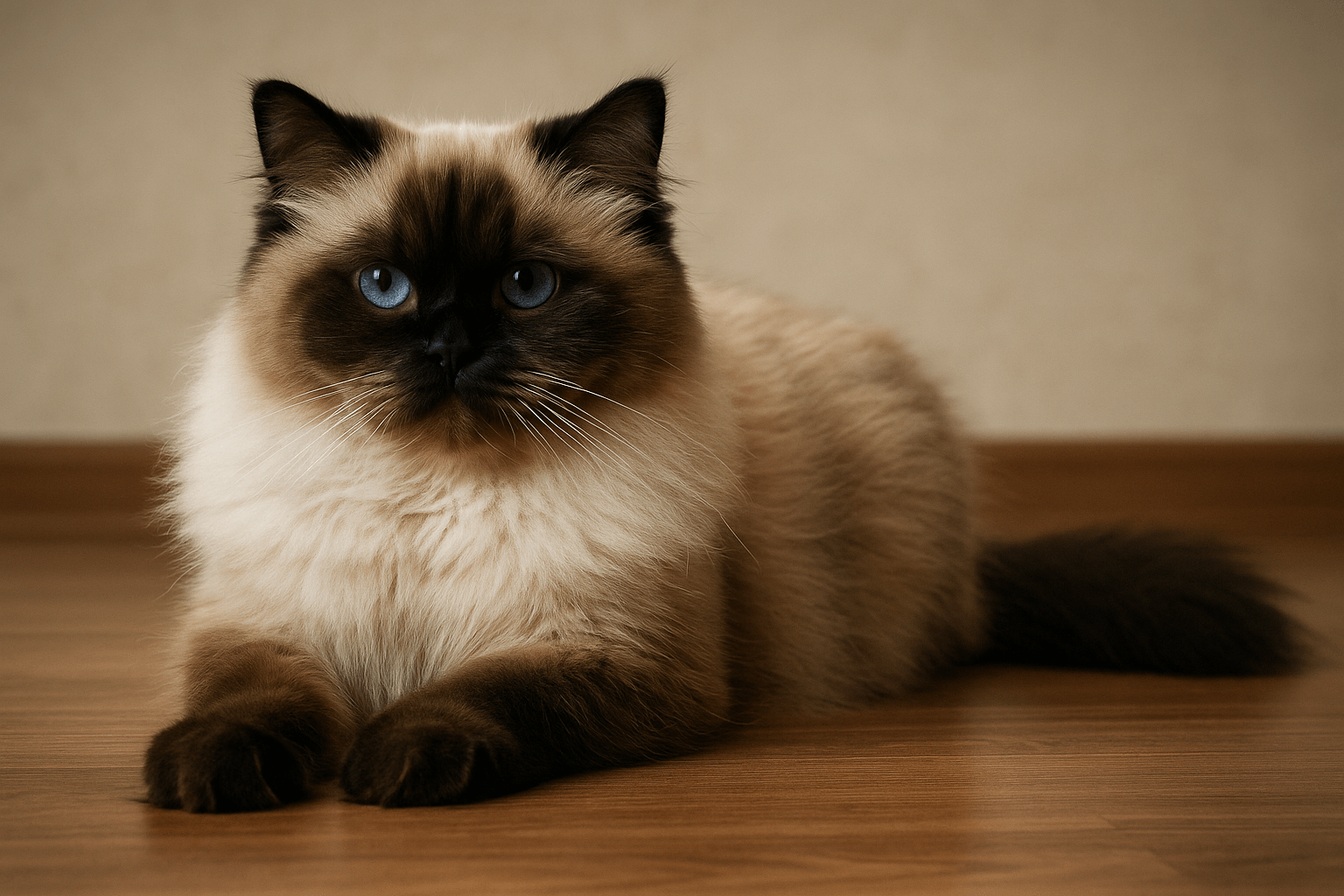Cat Hyperventilating: What You Need to Know
Watching your cat hyperventilate can be a frightening experience. While cats are known for their calm and composed demeanor, rapid or labored breathing may indicate an underlying issue that requires immediate attention. Hyperventilation in cats can stem from a variety of causes, ranging from stress and anxiety to more serious medical conditions like heart disease or respiratory infections. Understanding the signs, symptoms, and potential triggers is crucial for ensuring your feline friend receives the care they need. In this blog post, we’ll explore everything you need to know about cat hyperventilation, including how to identify it, what might cause it, and when to seek veterinary help.
Signs and Symptoms of Cat Hyperventilation
Recognizing the signs of hyperventilation in your cat is the first step toward addressing the issue. Look out for these symptoms to determine whether your cat is experiencing abnormal breathing patterns.
Rapid Breathing (Tachypnea):
A cat breathing faster than usual without apparent exertion may be hyperventilating. Count their breaths per minute—anything over 40 could indicate trouble.Open-Mouthed Breathing:
Cats typically breathe through their noses. If your cat is panting or breathing with their mouth open, it could signal distress.Shallow or Labored Breaths:
Notice if your cat’s breathing seems shallow, uneven, or accompanied by wheezing or coughing.Blue Gums or Tongue:
Bluish discoloration of the gums or tongue indicates a lack of oxygen and requires emergency care.Lethargy or Weakness:
If your cat seems unusually tired, unresponsive, or unable to move normally, it may be linked to breathing difficulties.
Understanding these signs can help you act quickly to protect your cat’s health and well-being.
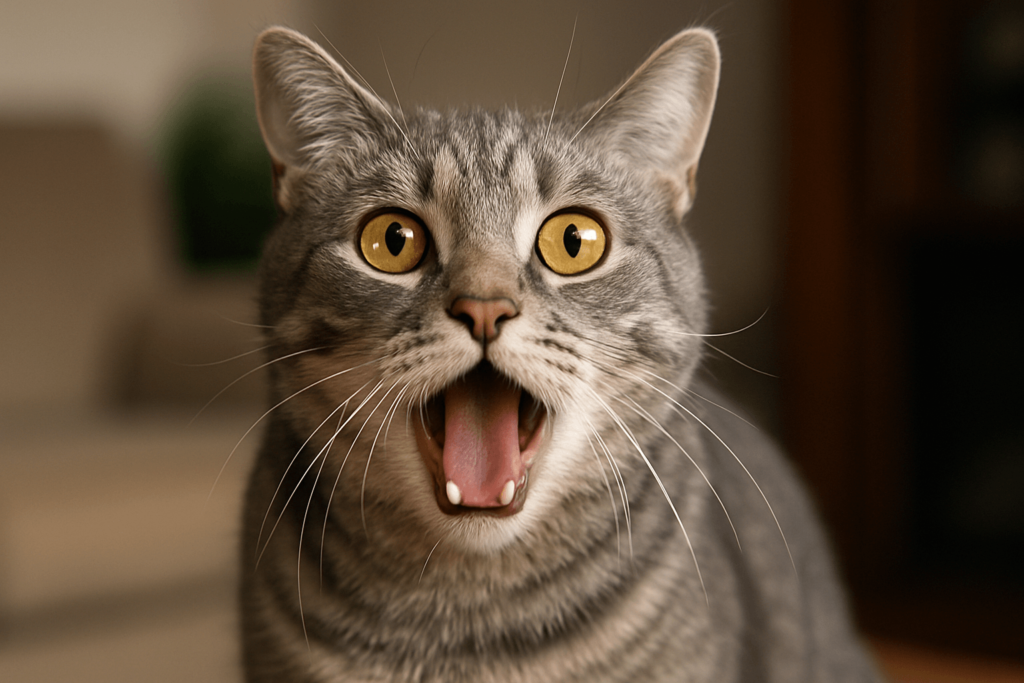
Common Causes of Hyperventilation in Cats
Hyperventilation in cats can result from a wide range of factors, both physical and emotional. Identifying the root cause is essential for proper treatment.
Stress or Anxiety:
Loud noises, unfamiliar environments, or traumatic events can trigger hyperventilation as a stress response.Heatstroke:
Overheating in hot weather can lead to rapid breathing as your cat attempts to cool down.Respiratory Infections:
Conditions like pneumonia or upper respiratory infections can cause difficulty breathing and hyperventilation.Heart Disease:
Congestive heart failure or other cardiac issues may lead to fluid buildup in the lungs, causing labored breathing.Toxin Exposure:
Ingesting harmful substances, such as cleaning products or plants like lilies, can irritate the respiratory system and lead to hyperventilation.
By identifying these potential causes, you can take steps to address the issue and prevent future episodes.
Check this guide 👉Healthy Cat Teeth vs Unhealthy: Best 7 Expert Tips!
Check this guide 👉Unhealthy Cat Tongue: Best 7 Expert Tips!
Check this guide 👉Why Does My Cat Breathe Loud? Best 7 Health Tips!
Possible Causes of Hyperventilation | Symptoms to Watch For |
|---|---|
Stress or anxiety | Rapid breathing, pacing, vocalization |
Heatstroke | Panting, drooling, lethargy |
Respiratory infections | Coughing, sneezing, nasal discharge |
Heart disease | Weakness, fainting, blue gums |
Toxin exposure | Vomiting, drooling, difficulty breathing |
What to Do If Your Cat Is Hyperventilating
If you notice your cat hyperventilating, staying calm and acting promptly is key to helping them recover safely. Follow these steps to address the situation effectively.
Move Them to a Quiet Space:
Relocate your cat to a calm, quiet area away from noise or stressors to help them relax.Check for Obvious Triggers:
Look for signs of overheating, injury, or environmental stress that might be causing the episode.Monitor Their Breathing:
Observe your cat’s breathing pattern closely and note any changes in behavior or appearance.Provide Fresh Water:
Ensure your cat has access to fresh water, especially if heatstroke or dehydration might be contributing factors.Contact Your Veterinarian:
If the hyperventilation persists or is accompanied by other concerning symptoms, seek professional advice immediately.
Taking these steps ensures your cat receives the care they need while minimizing further stress.
Preventive Measures to Avoid Hyperventilation
Preventing hyperventilation involves proactive measures to maintain your cat’s overall health and well-being. These strategies can reduce the risk of breathing difficulties.
Keep Your Home Cool:
Ensure your home is well-ventilated during hot weather to prevent overheating and heatstroke.Minimize Stressful Situations:
Create a safe, predictable environment for your cat to reduce anxiety and stress-related hyperventilation.Schedule Regular Vet Checkups:
Routine examinations can detect underlying health issues before they lead to breathing problems.Avoid Toxic Substances:
Keep harmful chemicals, plants, and small objects out of reach to prevent accidental poisoning.Encourage Healthy Activity:
Provide toys and climbing structures to keep your cat active and maintain their cardiovascular health.
By implementing these preventive measures, you can help ensure your cat stays happy, healthy, and free from breathing issues.
First Aid Tips for Cat Hyperventilation
If your cat is hyperventilating, providing basic first aid can stabilize their condition until professional help is available. Here are some actionable steps to follow.
Stay Calm and Reassuring:
Your cat can sense your emotions. Staying calm helps them feel more secure during the episode.Cool Them Down Gradually:
If overheating is suspected, use a damp cloth to gently cool their paws and body, avoiding ice-cold water.Avoid Restraining Them:
Restricting movement too much can increase stress. Allow them space to settle down naturally.Position Them Comfortably:
Place your cat in an upright position to help improve airflow and ease breathing.Document Symptoms:
Note the duration, severity, and accompanying symptoms to share with your veterinarian later.
These first aid tips can make a significant difference in managing a hyperventilation episode effectively.
Understanding Feline Stress Triggers
Stress is a common cause of hyperventilation in cats. Identifying and addressing potential stressors can prevent future episodes and improve your cat’s quality of life.
Changes in Routine:
Sudden disruptions to feeding schedules or daily activities can unsettle your cat. Maintain consistency whenever possible.New Pets or People:
Introducing new animals or visitors into the home can overwhelm sensitive cats. Gradual introductions help ease the transition.Loud Noises:
Fireworks, thunderstorms, or construction sounds can trigger anxiety. Provide a safe hiding spot to help them cope.Travel or Car Rides:
Many cats find travel stressful. Use calming sprays or pheromone diffusers to create a soothing environment.Veterinary Visits:
Trips to the vet can be intimidating. Bring familiar items like blankets or toys to comfort your cat during appointments.
By addressing these stress triggers, you can minimize the likelihood of hyperventilation caused by anxiety.
Long-Term Care for Cats Prone to Breathing Issues
For cats prone to hyperventilation or respiratory problems, long-term care strategies are essential to maintaining their health and comfort.
Maintain a Balanced Diet:
Proper nutrition supports overall health, including respiratory function. Consult your vet for dietary recommendations.Regular Exercise:
Encourage moderate activity to strengthen your cat’s cardiovascular system and improve lung capacity.Monitor Weight:
Obesity can exacerbate breathing difficulties. Keep your cat at a healthy weight through portion control and exercise.Use Humidifiers:
Dry air can irritate your cat’s respiratory system. A humidifier adds moisture to the air, promoting easier breathing.Follow Treatment Plans:
If your cat has a chronic condition, adhere to prescribed medications and therapies to manage symptoms effectively.
With consistent care and attention, you can help your cat live comfortably despite their predisposition to breathing challenges.
Frequently Asked Questions About Cat Hyperventilation
Is it normal for cats to pant?
No, panting is not typical for cats. If your cat is panting, it may indicate stress, overheating, or a medical issue.
How can I tell if my cat is having trouble breathing?
Signs include rapid breathing, open-mouthed panting, wheezing, coughing, or blue gums.
When should I take my cat to the vet?
Seek immediate veterinary care if your cat’s hyperventilation persists, worsens, or is accompanied by other alarming symptoms.
Can stress cause hyperventilation in cats?
Yes, stress or anxiety can trigger rapid breathing as part of a fight-or-flight response.
How can I calm my cat during a hyperventilation episode?
Move them to a quiet space, speak softly, and avoid sudden movements to help them relax.
Prioritizing Your Cat’s Respiratory Health
Hyperventilation in cats is a serious symptom that should never be ignored. By understanding the possible causes, recognizing the signs, and knowing how to respond, you can play a vital role in safeguarding your cat’s health. Whether it’s preventing stress, keeping your home safe, or seeking timely veterinary care, every action you take contributes to your feline companion’s well-being. Remember, your cat relies on you to advocate for their health—so stay vigilant, informed, and ready to act when needed. With proper care and attention, you can ensure your furry friend enjoys a long, happy, and healthy life.
Giardia in Cats: Best 7 Expert Tips! Discover expert advice on identifying, treating, and preventing giardia in cats to ensure your feline stays happy and healthy.
Cat Hyperventilating: Best 7 Expert Tips! Discover signs, causes, and solutions for cat hyperventilation. Learn how to calm your cat and when to seek veterinary care for their breathing issues.
Anemic Cat Gums vs Normal: Best 7 Expert Tips! Learn to spot signs of anemia in cats, understand gum health, and ensure your feline stays happy and healthy with expert advice.
Himalayan Cat Size: Best 7 Expert Tips! Discover expert advice on Himalayan cat size, growth factors, care tips, and how to ensure your feline stays healthy and happy.

